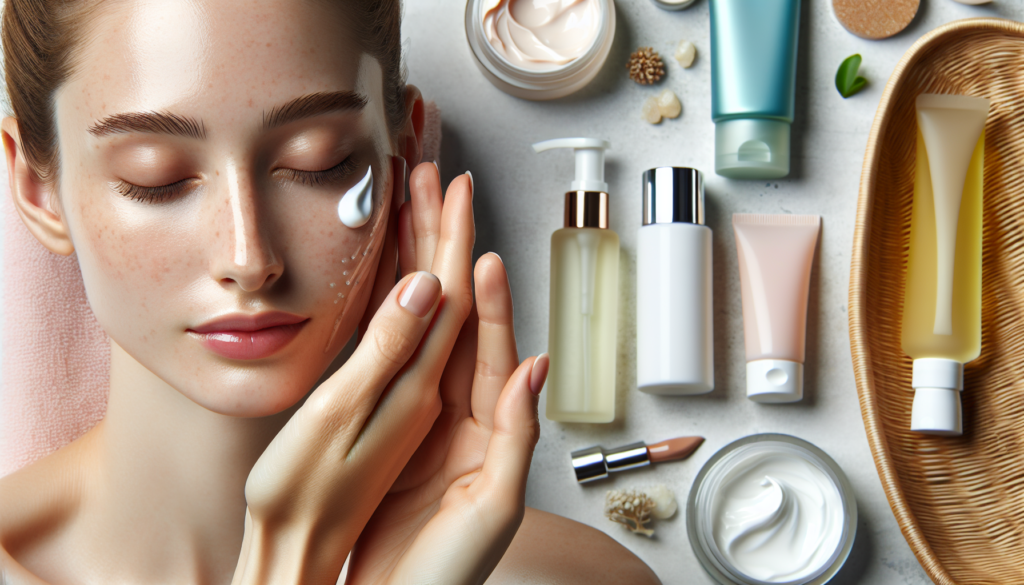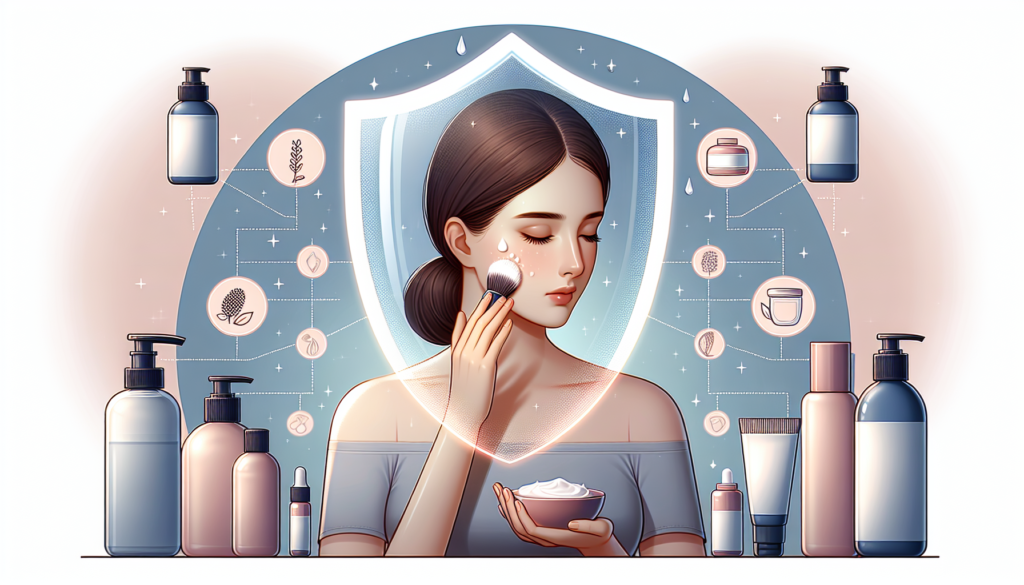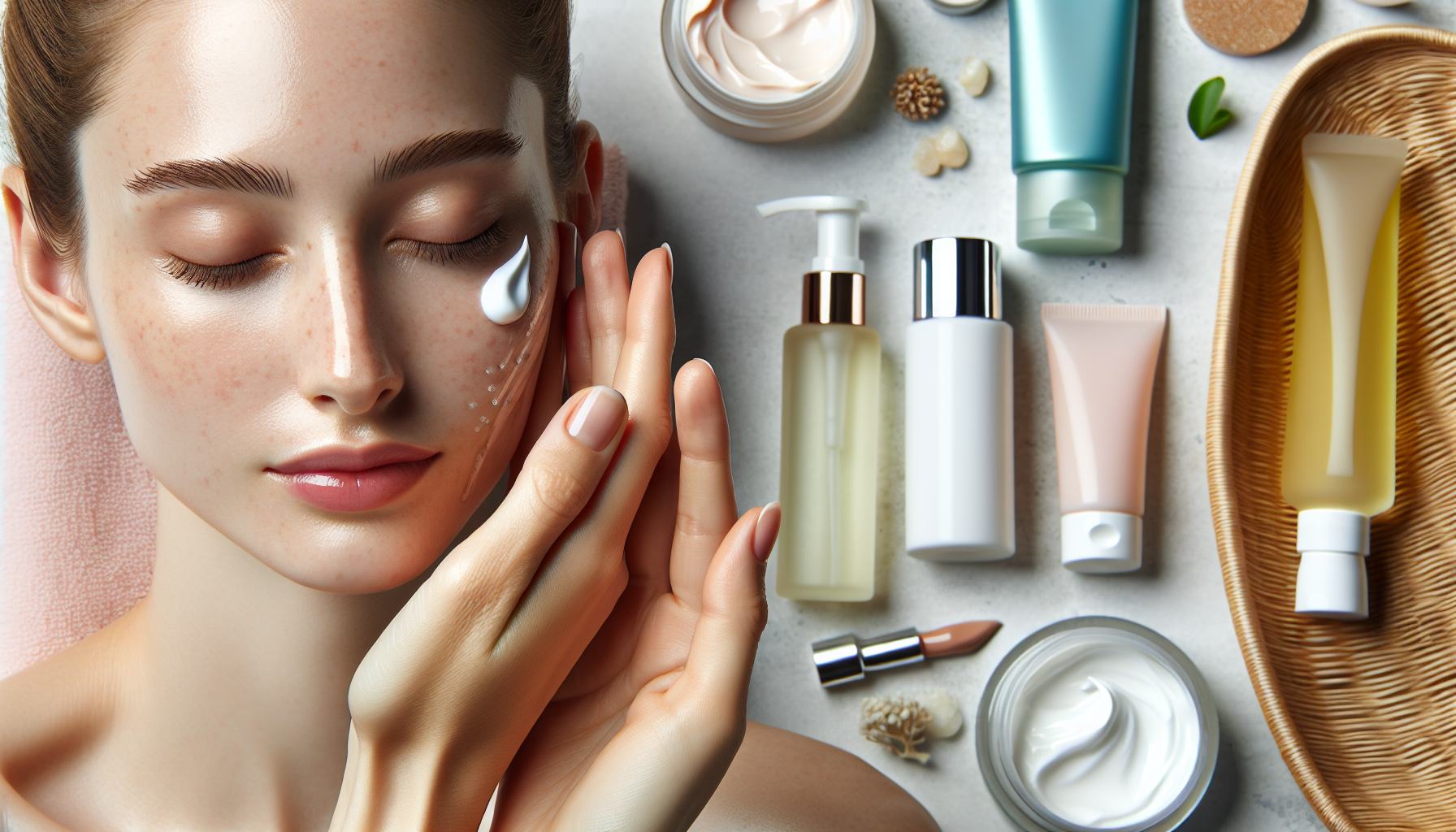You’ve probably experienced the frustration of waking up to a new breakout, seemingly out of nowhere. Hormonal acne can be a pesky and persistent problem, but there’s good news – the right skincare products can help prevent those frustrating breakouts. Understanding how hormones affect your skin and knowing which products to incorporate into your routine can make all the difference. In this article, we’ll explore the causes of hormonal acne and provide you with practical tips to keep your skin clear and glowy. Say goodbye to those surprise breakouts and hello to a healthier, happier complexion.
Understanding Hormonal Acne
Hormonal acne refers to acne that is primarily caused by hormonal fluctuations in the body, specifically an increase in androgen levels. Androgens are hormones that are naturally present in both males and females, and when their levels rise, they can stimulate the oil glands in the skin to produce more sebum, leading to the development of acne.
Common Causes of Hormonal Acne
Hormonal acne can be caused by a variety of factors, including puberty, menstrual cycles, pregnancy, and menopause. During these times, there is a significant increase in hormonal activity, which can trigger the onset or worsening of acne. Other factors that can contribute to hormonal acne include certain medications, such as birth control pills or hormone replacement therapy, as well as underlying medical conditions like polycystic ovary syndrome (PCOS) or adrenal disorders.
How Hormones Affect Skin Health and Acne Production
Hormones play a crucial role in skin health and acne production. When androgen levels increase, they stimulate the sebaceous glands in the skin to produce more sebum. Excess sebum, along with dead skin cells and bacteria, can clog the pores, leading to the formation of comedones (blackheads and whiteheads). If these blockages become inflamed, they can result in the appearance of red, swollen, and painful pimples.
Identifying Your Acne Type
It is essential to identify the type of acne you have, as hormonal acne can present differently from other types of acne. Hormonal acne often appears along the jawline, chin, and lower cheeks, whereas other types of acne may be more widespread across the face, back, or chest. Additionally, hormonal acne tends to be deep, cystic, and painful, while other types of acne may consist of smaller, more superficial pimples.
Symptoms of Hormonal Acne
In addition to the location and nature of the acne lesions, there are other symptoms that can help identify hormonal acne. Women may experience an increase in acne breakouts right before or during their menstrual cycle, indicating hormonal fluctuations. Hormonal acne can also be accompanied by other signs of hormonal imbalance, such as irregular periods, mood swings, or excessive hair growth.
Professional Diagnosis
If you suspect that you have hormonal acne, it is recommended to seek professional diagnosis from a dermatologist. A dermatologist will examine your skin and ask about your medical history to determine the underlying cause of your acne. They may also order blood tests to measure hormone levels and rule out any underlying medical conditions contributing to your acne.
The Relationship Between Skincare Products and Acne
Skincare products can play a significant role in either provoking or preventing acne breakouts. Certain ingredients in skincare products, such as comedogenic oils or synthetic fragrances, can clog pores and contribute to the development of acne. On the other hand, using the right skincare products can help regulate oil production, reduce inflammation, and promote healthy skin function.
How Skincare Products Can Provoke Acne
Some skincare products contain ingredients that can aggravate acne-prone skin. Comedogenic oils, such as coconut oil or cocoa butter, have a high likelihood of clogging pores and triggering acne breakouts. Additionally, products that contain synthetic fragrances or harsh chemicals can irritate the skin, leading to inflammation and acne flare-ups.
Ingredients to Avoid in Skincare Products
When selecting skincare products for acne-prone skin, it is important to avoid certain ingredients that can worsen acne. Comedogenic oils, such as mineral oil or lanolin, should be avoided as they can clog pores. Similarly, synthetic fragrances and dyes can irritate the skin and exacerbate acne symptoms. It is also advisable to steer clear of products containing alcohol or sulfates, as they can strip the skin of its natural oils and disrupt the skin’s barrier function.
Protective Role of Skincare Products Against Acne
While some skincare products can provoke acne, others can help manage and prevent it. Look for products that are non-comedogenic, meaning they are specially formulated to not clog pores. Ingredients like salicylic acid, benzoyl peroxide, or tea tree oil can help exfoliate the skin, kill bacteria, and reduce inflammation. Additionally, using products with anti-inflammatory ingredients, such as niacinamide or aloe vera, can help calm acne-prone skin.

Choosing the Right Skincare Products
Selecting the right skincare products for hormonal acne is crucial in effectively managing breakouts. Look for products specifically designed for acne-prone or oily skin types, as they are formulated to address the unique needs of such skin conditions. Additionally, opt for products that contain acne-fighting ingredients like salicylic acid or benzoyl peroxide. It is also important to consider your skin’s individual needs, such as hydration or sensitivity, when choosing products.
Selecting Acne-Fighting Ingredients
When choosing skincare products for hormonal acne, it is essential to look for ingredients that target the underlying causes of acne. Salicylic acid is a common ingredient found in cleansers, toners, and spot treatments that helps exfoliate the skin, unclog pores, and reduce inflammation. Benzoyl peroxide is another effective ingredient that kills acne-causing bacteria. Each individual’s skin may respond differently to these ingredients, so it may be necessary to experiment and find what works best for you.
Balancing Skin pH with Products
Maintaining a balanced pH level in the skin can help prevent acne breakouts. The skin’s natural pH is slightly acidic, which helps to maintain its protective barrier. Using skincare products that are pH-balanced, or slightly acidic, can help support the skin’s natural defense mechanisms and prevent the growth of acne-causing bacteria. Look for products labeled as pH-balanced or those containing ingredients like hyaluronic acid, which can help maintain the skin’s moisture balance.
Choosing Products for Your Skin Type
It is important to choose skincare products that are specifically formulated for your skin type. If you have oily or acne-prone skin, look for products that are lightweight, oil-free, and non-comedogenic. These products are designed to control excess sebum production and prevent pore blockages. If you have dry or sensitive skin, opt for products that are hydrating and gentle, as these will help soothe and nourish your skin without causing irritation.
Recommended Skincare Products for Hormonal Acne
When it comes to skincare products for hormonal acne, there are a variety of options available. Here are some suggestions for cleansers, toners, moisturizers, serums, and sunscreens that can benefit those with hormonal acne:
Cleansers and Toners Suggestions
- A gentle foaming cleanser with salicylic acid to exfoliate and cleanse pores.
- A soothing toner with witch hazel or tea tree oil to rebalance the skin’s pH and reduce inflammation.
Moisturizers and Serums Suggestions
- An oil-free, non-comedogenic moisturizer with hyaluronic acid to hydrate the skin without clogging pores.
- A serum with niacinamide or vitamin C to brighten the skin and reduce redness and inflammation.
Sunscreens Suggestions
- An oil-free, non-comedogenic sunscreen with SPF 30 or higher to protect the skin from harmful UV rays without causing breakouts.
Role of Over-the-Counter (OTC) Products in Hormonal Acne Prevention
Over-the-counter (OTC) products can be an effective tool in preventing and managing hormonal acne. These products are easily accessible without a prescription and can help control oil production, exfoliate the skin, and kill acne-causing bacteria.
Effects of Non-Prescription Products
Non-prescription OTC products can help reduce acne symptoms by targeting the underlying causes of acne. Ingredients like salicylic acid or benzoyl peroxide can exfoliate the skin, unclog pores, and kill bacteria, resulting in fewer breakouts. These products can also help reduce inflammation and redness associated with acne.
Choosing the Right OTC Products
With numerous OTC options available, it is important to choose products that suit your skin type and address your specific acne concerns. Look for products labeled as non-comedogenic and formulated for acne-prone skin. Additionally, consider the concentration of active ingredients, as higher concentrations may be more suitable for severe acne, while lower concentrations are ideal for milder acne.
Suggested OTC Products for Hormonal Acne
Here are some OTC products that have been recommended for hormonal acne:
- A salicylic acid cleanser to exfoliate and unclog pores.
- A benzoyl peroxide spot treatment to kill acne-causing bacteria.
- A clay mask with sulfur to absorb excess oil and reduce inflammation.
- An oil-free, non-comedogenic moisturizer with green tea extract to soothe and hydrate the skin.
Use of Prescription Products in Treating Hormonal Acne
In severe cases of hormonal acne, prescription medications may be necessary to effectively manage breakouts. Dermatologists can prescribe topical treatments, such as retinoids or antibiotics, as well as oral medications, like birth control pills or spironolactone, to regulate hormonal imbalances and reduce acne symptoms.

Instances to Resort to Prescription Products
Prescription products are typically recommended when over-the-counter treatments have been ineffective in controlling hormonal acne. If your acne is severe, persistent, or causing significant emotional distress, it may be time to consult with a dermatologist for a prescription treatment plan.
How to Use Prescribed Products
When using prescription products for hormonal acne, it is crucial to follow the instructions provided by your dermatologist. They will guide you on the proper application frequency, potential side effects, and any precautions to take while using the medication. It is important to use these products consistently and as directed to achieve the best results.
Potential Side Effects
Prescription acne medications can have potential side effects, and it is essential to be aware of these before starting treatment. Some common side effects include dryness, redness, peeling, or increased sensitivity to sunlight. Your dermatologist will discuss these potential side effects with you and provide guidance on how to manage them effectively.
Importance of Regular Skincare Routine
Establishing a daily skincare routine is crucial for managing hormonal acne and preventing breakouts. Consistency and proper skincare practices can help regulate oil production, unclog pores, and maintain healthy skin.
Establishing a Daily Skincare Routine
A basic daily skincare routine for hormonal acne can include the following steps:
- Cleansing: Cleanse your face twice a day with a gentle, non-comedogenic cleanser to remove dirt, oil, and impurities.
- Toning: Use a toner after cleansing to rebalance the skin’s pH and remove any remaining residue.
- Treatment: Apply acne-fighting treatment products, such as serums or spot treatments, to target active breakouts.
- Moisturizing: Hydrate your skin with an oil-free, non-comedogenic moisturizer to restore moisture without clogging pores.
- Sun Protection: Apply a broad-spectrum sunscreen with at least SPF 30 to protect your skin from harmful UV rays.
Role of Consistency in Acne Treatment
Consistency is key when it comes to acne treatment. Hormonal acne can take time to improve, and sticking to a regular skincare routine allows for the continuous application of acne-fighting ingredients. It is important to be patient and give your skincare products enough time to work before expecting significant results.
Adjusting Your Skincare Routine with Seasons
As the seasons change, it may be necessary to adjust your skincare routine to accommodate the varying needs of your skin. During colder months, for example, you may need to use richer moisturizers to combat dryness. Similarly, in warmer months, it may be beneficial to use lighter, oil-free formulations to prevent excess sebum production.
Lifestyle Changes for Preventing Hormonal Acne
In addition to skincare products, certain lifestyle changes can help prevent hormonal acne breakouts. Making adjustments to your diet, managing stress levels, and incorporating physical activity into your routine can contribute to hormonal balance and overall skin health.
Importance of Balanced Diet
A balanced diet plays a significant role in maintaining hormonal balance and healthy skin. Consuming a variety of fruits, vegetables, whole grains, lean proteins, and healthy fats can provide essential nutrients that support skin health. Limiting the intake of processed foods, refined sugars, and dairy products, which are known to exacerbate acne, can also be beneficial.
Link Between Stress and Acne
Stress can have a profound impact on hormonal balance and contribute to acne breakouts. When you are stressed, your body releases stress hormones like cortisol, which can trigger an increase in sebum production and inflammation. Engaging in stress-reducing activities such as meditation, yoga, or deep breathing exercises can help manage stress levels and reduce the risk of hormonal acne.
Benefits of Physical Activity in Hormonal Balance
Regular physical activity not only promotes overall well-being but also helps maintain hormonal balance. Exercise helps regulate insulin levels, reduce inflammation, and improve blood circulation, which can all contribute to healthier skin. Aim for at least 30 minutes of moderate-intensity exercise, such as brisk walking or cycling, on most days of the week.
Consulting a Dermatologist
If your hormonal acne is persistent, severe, or causing significant distress, it is best to seek the help of a dermatologist. A dermatologist can provide you with professional acne treatment tailored to your specific needs and help you develop a personalized treatment plan.
When to Seek a Dermatologist’s Help
You should consider consulting a dermatologist for hormonal acne if:
- Over-the-counter treatments have been ineffective in managing your acne.
- Your acne is severe and cystic, causing pain and scarring.
- You are experiencing emotional distress due to your acne.
- Your acne is accompanied by other symptoms of hormonal imbalance.
- You have underlying medical conditions, such as PCOS or adrenal disorders, contributing to your acne.
Benefits of Professional Acne Treatment
Professional acne treatment from a dermatologist offers several advantages over self-treatment. A dermatologist has the expertise to determine the underlying cause of your acne and provide you with targeted solutions. They can also prescribe stronger medications or procedures, such as chemical peels, laser therapy, or corticosteroid injections, if necessary. Regular follow-up appointments with a dermatologist can ensure that your treatment plan is effective and adjusted as needed.
Building a Treatment Plan with a Dermatologist
When working with a dermatologist, they will assess your skin condition, medical history, and treatment goals to develop a comprehensive treatment plan. This plan may include a combination of prescription medications, professional treatments, and recommendations for lifestyle changes and skincare products. It is important to communicate openly with your dermatologist and follow their instructions to achieve the best results in managing hormonal acne.
